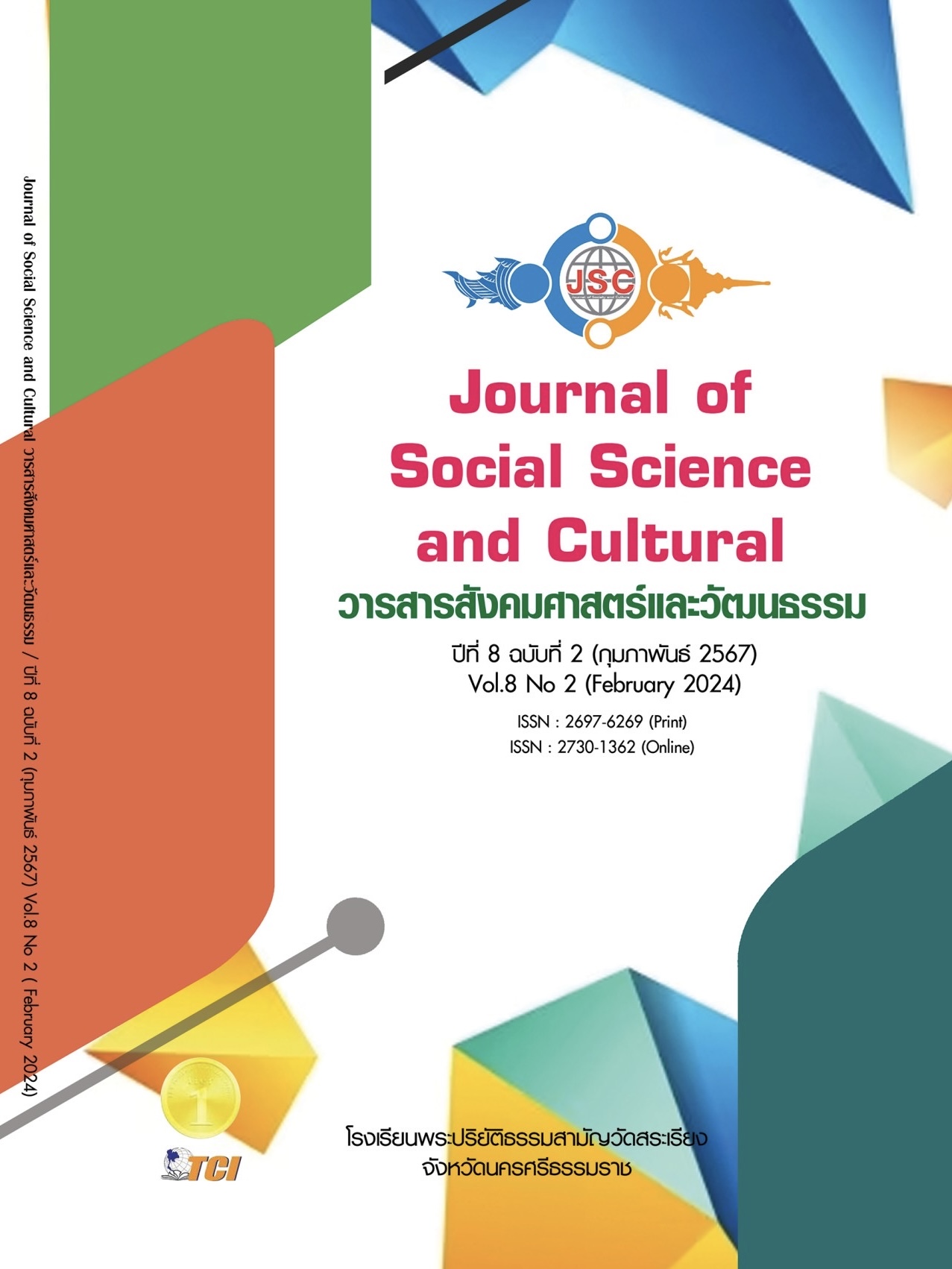SOFT POWER COMMUNICATION THROUGH THE CULTURE OF OFFERING TO ANCESTORS OF THE KUI-KHMER COMMUNITY IN THE LOCAL COMMUNITY OF SOUTHERN ISAAN
Main Article Content
Abstract
This research is qualitative research. The objectives are to 1) study the local culture in the ancestor worship ceremony of the Kui-Khmer community, Southern Isan Local Community . as the soft power of the community 2) to study the communication model in transmitting local culture in the ancestral ceremony of the Kui-Khmer community and the result of this research will present some guidelines for developing integrated communications to convey local culture as a soft power that can benefit communities in creating unity and promoting the creative economy and tourism. By studying in the area of Sangkha District Surin Province, due to this local community that has a unique identity in terms of culture. wisdom and belief Including ancient sites which are physical evidence. The researcher uses the concept of communication. and the concept of community cultural economy It is a framework for studying. From document study and in-depth interviews with a key informant of 10 people, selected purposively. The research tools used were in-depth interviews. The research results found that the value of local cultural traditions as soft power. It is a power and an important tool that helps create unity. Help and support occur in the community. On the one hand, the soft power that was conveyed by Old Man Cham in the ancestral ceremony. It functions like common law with regulations that determine behavior in living together between people and people. people and nature It is a power without coercion. Leads to willing and sustained compliance. Soft power communicated through the tradition of offering offerings to ancestors thus bringing peace to the community Living together under mutual assistance Conservation of natural resources and a sense of community ownership. which is an important basis for sustainable development of local communities.
Article Details
References
กวี วงศ์พุฒ. (2535). ภาวะผู้นำ. กรุงเทพมหานคร: บี. เค. อินเตอร์ปรินท์.
งามพิศ สัตย์สงวน. (2543). ความเชื่อ ประเพณี พิธีกรรมและคติชาวบ้านเกี่ยวกับข้าว. ใน ข้าวกับวิถีชีวิตไทย. กรุงเทพมหานคร: สำนักงานคณะกรรมการวัฒนธรรมแห่งชาติ.
เจริญ ไวรวัจนกุล. (2544). วัฒนธรรมอินโดจีน. สุรินทร์: อาศรมภูมิปัญญา สถาบันราชภัฏสุรินทร์.
ฉัตรทิพย์ นาถสุภา. (2543). ประวัติศาสตร์เศรษฐกิจไทย. กรุงเทพมหานคร : สำนักพิมพ์จุฬาลงกรณ์มหาวิทยาลัย.
ชนะใจ ต้นไทรทอง. (2565). กลยุทธ์การสร้างซอฟต์พาวเวอร์ในภาพยนตร์ไทยเพื่อส่งเสริมจุดหมายปลายทางการท่องเที่ยว. ดุษฏีนิพนธ์ปรัชญาดุษฎีบัณฑิต สาขาการจัดการท่องเที่ยว โรงแรมและอีเวนต์ มหาวิทยาลัยศิลปากร.
ฐณยศ โล่พัฒนานนท์. (2021). ความสอดคล้องของโครงสร้างอุตสาหกรรมการผลิตภาพยนตร์ไทยกับยุทธศาสตร์การส่งเสริมภาพยนตร์และวีดิทัศน์ระยะที่ 3 (พ.ศ. 2560-2564) วารสารนิเทศศาสตร์ธุรกิจบัณฑิตย์. 13 (1), 43-79
ฐิตาภา บำรุงศิลป์ และคณะ. (2564). การมีส่วนร่วมของชุมชนในการพัฒนาศักยภาพการท่องเที่ยวชุมชนบ้านวังรี จังหวัดนครนายก. วารสารวิทยาการจัดการมหาวิทยาลัยราชภัฏพิบูลสงคราม, 3(3), 1-14.
ดวงพร คำนูญวัฒน์. (2555). การสื่อสารชุมชน. กรุงเทพมหานคร: จรัลสนิทวงศ์การพิมพ์.
นิฌามิล หะยีซะ. (2566). อะไร ๆ ก็ “ซอฟต์พาวเวอร์”. กรุงเทพมหานคร: ศูนย์มานุษยวิทยาสิรินธร (องค์การมหาชน).
นิติ ภวัครพันธุ์. (2022).‘Soft power’ ไทย: ฝันลม ๆ แล้ง ๆ ของคนใช้แต่อำนาจ. เรียกใช้เมื่อ 24 มิถุนายน 2566 จาก https://www.the101.world/why-soft-power-is-not-successful-in-thailand/
ปรีชา ตั้งสุขขีย์ศิริ และคณะ. (2565). แนวทางส่งเสริมการท่องเที่ยวบนพื้นฐานของซอฟต์พาวเวอร์ด้านอาหารพื้นถิ่นจังหวัดสุโขทัย. วารสารวิทยาการจัดการมหาวิทยาลัยราชภัฏพิบูลสงคราม, 4(2),77-89.
ผู้ให้ข้อมูลคนที่ 1. (3 มีนาคม 2566). การสื่อสารซอฟต์พาวเวอร์ผ่านสื่อวัฒนธรรมเซ่นสรวงปู่ตาของชุมชนกูย-เขมร ในชุมชนท้องถิ่นอีสานใต้. (อรัญญา พงศ์สะอาด, ผู้สัมภาษณ์)
ผู้ให้ข้อมูลคนที่ 2. (3 มีนาคม 2566). การสื่อสารซอฟต์พาวเวอร์ผ่านสื่อวัฒนธรรมเซ่นสรวงปู่ตาของชุมชนกูย-เขมร ในชุมชนท้องถิ่นอีสานใต้. (อรัญญา พงศ์สะอาด, ผู้สัมภาษณ์)
ผู้ให้ข้อมูลคนที่ 3. (12 เมษายน 2566). การสื่อสารซอฟต์พาวเวอร์ผ่านสื่อวัฒนธรรมเซ่นสรวงปู่ตาของชุมชนกูย-เขมร ในชุมชนท้องถิ่นอีสานใต้. (อรัญญา พงศ์สะอาด, ผู้สัมภาษณ์)
ผู้ให้ข้อมูลคนที่ 4. (12 เมษายน 2566). การสื่อสารซอฟต์พาวเวอร์ผ่านสื่อวัฒนธรรมเซ่นสรวงปู่ตาของชุมชนกูย-เขมร ในชุมชนท้องถิ่นอีสานใต้. (อรัญญา พงศ์สะอาด, ผู้สัมภาษณ์)
ผู้ให้ข้อมูลคนที่ 5. (3 มีนาคม 2566). การสื่อสารซอฟต์พาวเวอร์ผ่านสื่อวัฒนธรรมเซ่นสรวงปู่ตาของชุมชนกูย-เขมร ในชุมชนท้องถิ่นอีสานใต้. (อรัญญา พงศ์สะอาด, ผู้สัมภาษณ์)
พีระ เจริญวัฒนนุกูล. (2565). SOFT POWER ที่เป็นมากกว่าการขายของ มุมมองฉบับรัฐศาสตร์. เรียกใช้เมื่อ 24 มิถุนายน 2566 จาก https://tu.ac.th/thammasat-020565-soft-power
ไพฑูร มีกุศล. (2533). การศึกษากลุ่มชาติพันธ์ในประเทศไทย: กรณีศึกษาไทยกูย. กรุงเทพมหานคร: สมาคมสังคมศาสตร์แห่งประเทศไทย.
ภูมิจิต เรืองเดช. (2542). คติชนวิทยา. บุรีรัมย์: มหาวิทยาลัยราชภัฎบุรีรัมย์.
รุยาภรณ์ สุคนธทรัพย์. (2561). การบริหารจัดการทรัพยากร Soft Power ของไทย. วารสารรัฏฐาภิรักษ์, 60(3), 47-55.
วรนัย พงศาชลากร. (2550). เนะแขมร์ อินไทยแลนด์: หลากหลายมุมมองและเรื่องราวของปราสาทเขมรในเมืองไทย ตามใจ ตามอารมณ์. กรุงเทพมหานคร: สำนักพิมพ์มิวเซียมบุคส์.
วิริยะ สว่างโชติ. (2561). อุตสาหกรรมกับเศรษฐกิจทางวัฒนธรรมสร้างสรรค์. กรุงเทพมหานคร: โรงพิมพ์ภาพพิมพ์.
ศรีศักร วัลลิโภดม. (2556). ประวัติศาสตร์ท้องถิ่น : ประวัติศาสตร์ของสังคมที่หายไป. ใน ปฏิบัติการประวัติศาสตร์ท้องถิ่น. ค่ายริมขอบฟ้า: เมืองโบราณ สมุทรปราการ.
สำนักงานพัฒนาวิทยศาสตร์และเทคโนโลยีแห่งชาติ (สวทช.). (2564). วิทยาศาสตร์ เทคโนโลยี และนวัตกรรมเพื่อการพัฒนาอย่างยั่งยืน. ปทุมธานี: สำนักงานพัฒนาวิทยาศาสตร์และเทคโนโลยีแห่งชาตสำนักงาน.
สุภัทรดิศ ดิศกุล. (2539). ท่องอารยธรรม: การค้นคว้าเกี่ยวกับโบราณคดีในประเทศไทย. (พิมพ์ครั้งที่ 1). กรุงเทพมหานคร: สำนักพิมพ์ธุรกิจก้าวหน้า
อิงอร เนตรานนท์. (2563). พลังอำนาจแห่งชาติซอฟต์พาวเวอร์ของไทยในศตวรรษที่ 21. วารสารสถาบันวิชาการป้องกันประเทศ, 11(1),33-47.
แอมอนิเย, เอเจียน. (Etienne Aymonier ) (2539). บันทึกการเดินทางในลาวภาคหนึ่ง พ.ศ. 2438. (แปลโดยทองสุมทร โดเรและสมหมาย เปรมจิตต์). เชียงใหม่: สถาบันวิจัย มหาวิทยาลัยเชียงใหม่.
Copper, R. (2004). Hard Power Soft Power and the Foals of Diplomacy. In Held, D. & Koening-Archibugi, M. (Eds.), American Power in the 21th Century. U.K.: Cambridge.
Huse, E. F. (1978). The Modern Manager. St. Paul, Minnesota: West Publishing.
Inglehart, R. & Welzel, C. (2005). Modernization, cultural change, and democracy: The human development sequence. Cambridge: Cambridge University Press.
Kropotkin, P. (1902). Mutual Aid: A Factor of Evolution. New York: McClure PHILLIPS & Co.,
Lock, E. (2010). Soft power and strategy. in Parmar, I., & Cox, M. (Eds.). Soft power and US foreign policy: theoretical, historical and contemporary perspectives. Oxfordshire: Routledge.
Nye, J. S. (1990). Soft Power. Foreign Policy. 80(Autumn), 153-171.
Nye, J. S. (2021). Soft power: the evolution of a concept. Journal of Political Power, 14(1), 196-208.
Nye, J. S., Jr. (2004). Soft Power: The Means to Success in World Politics. New York: Basic Books.
Roselle, L., et al. (2014). Strategic narrative: A new means to understand soft power. Media, war & conflict, 7(1), 70-84.
Ruiz-Real, J., et al. (2020). Destination branding: Opportunities and new challenge. Journal of Destination Marketing and Management 17(1), 1-13
Smith, A.G. (Ed). (1996). Communication and Culture: Reading in the codes of human interaction. New York: Holt, Rinehart & Winston.
Tylor, E.B. (2016). Primitive Culture: Researches into the Development of Mythology, Philosophy, Religion, Language, Art and Custom. New York: Dover Publications, Inc.
Wilson III, E. J. (2008). Hard power, soft power, smart power. The annals of the American academy of Political and Social Science, 616(1), 110-124.
Yulk, G.A. (2006). Leadership in Organizations. (6th ed.) NJ: Pearson Prentice-Hall.
Zaharna, R.S. (2007). The soft power differential: Network communication and mass communication in public diplomacy. The Hague journal of diplomacy, 2(3), 213-228.
Zamorano, M. M. (2016). Reframing cultural diplomacy: the instrumentalization of culture under the soft power theory. Culture Unbound, 8(2), 165-186.


